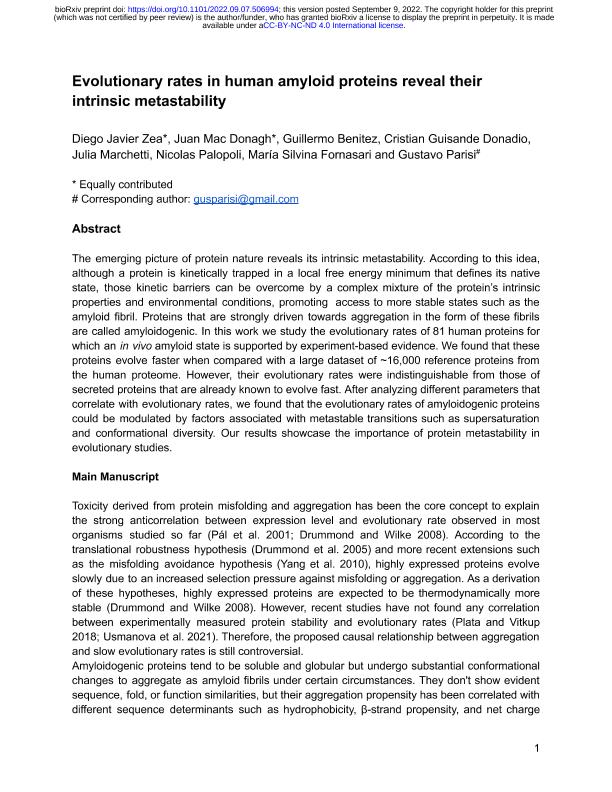Artículo
Evolutionary rates in human amyloid proteins reveal their intrinsic metastability
Zea, Diego Javier ; Mac Donagh, Juan
; Mac Donagh, Juan ; Benítez, Guillermo Ignacio
; Benítez, Guillermo Ignacio ; Guisande Donadio, Cristian Emanuel
; Guisande Donadio, Cristian Emanuel ; Marchetti, Julia
; Marchetti, Julia ; Palopoli, Nicolás
; Palopoli, Nicolás ; Fornasari, Maria Silvina
; Fornasari, Maria Silvina ; Parisi, Gustavo Daniel
; Parisi, Gustavo Daniel
 ; Mac Donagh, Juan
; Mac Donagh, Juan ; Benítez, Guillermo Ignacio
; Benítez, Guillermo Ignacio ; Guisande Donadio, Cristian Emanuel
; Guisande Donadio, Cristian Emanuel ; Marchetti, Julia
; Marchetti, Julia ; Palopoli, Nicolás
; Palopoli, Nicolás ; Fornasari, Maria Silvina
; Fornasari, Maria Silvina ; Parisi, Gustavo Daniel
; Parisi, Gustavo Daniel
Fecha de publicación:
09/2022
Editorial:
Cold Spring Harbor Laboratory Press
Revista:
bioRxiv
ISSN:
2692-8205
Idioma:
Inglés
Tipo de recurso:
Artículo publicado
Clasificación temática:
Resumen
The emerging picture of protein nature reveals its intrinsic metastability. According to this idea, although a protein is kinetically trapped in a local free energy minimum that defines its native state, those kinetic barriers can be overcome by a complex mixture of the protein’s intrinsic properties and environmental conditions, promoting access to more stable states such as the amyloid fibril. Proteins that are strongly driven towards aggregation in the form of these fibrils are called amyloidogenic. In this work we study the evolutionary rates of 81 human proteins for which an in vivo amyloid state is supported by experiment-based evidence. We found that these proteins evolve faster when compared with a large dataset of ∼16,000 reference proteins from the human proteome. However, their evolutionary rates were indistinguishable from those of secreted proteins that are already known to evolve fast. After analyzing different parameters that correlate with evolutionary rates, we found that the evolutionary rates of amyloidogenic proteins could be modulated by factors associated with metastable transitions such as supersaturation and conformational diversity. Our results showcase the importance of protein metastability in evolutionary studies.
Palabras clave:
PROTEIN
,
EVOLUTION
,
AMYLOID
Archivos asociados
Licencia
Identificadores
Colecciones
Articulos(SEDE CENTRAL)
Articulos de SEDE CENTRAL
Articulos de SEDE CENTRAL
Citación
Zea, Diego Javier; Mac Donagh, Juan; Benítez, Guillermo Ignacio; Guisande Donadio, Cristian Emanuel; Marchetti, Julia; et al.; Evolutionary rates in human amyloid proteins reveal their intrinsic metastability; Cold Spring Harbor Laboratory Press; bioRxiv; 2022; 9-2022; 1-12
Compartir
Altmétricas



